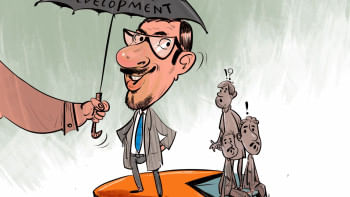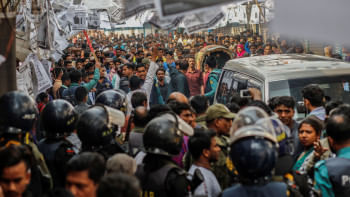What comes after January 7?

While the stage-managed show described as an "election" is a few days away and not a single vote has been cast, Sheikh Hasina and her party's victory is already a foregone conclusion. It is all but certain that Hasina will win in an essentially uncontested election and that her fourth consecutive term as the Prime Minister of Bangladesh will commence. The victory of the Awami League will be a thumping one like the two previous elections held in 2014 and 2018, described by the international media as "farcical" and "transparently fraudulent." What the diplomatic missions have identified as a "special election operation" of the government, The Economist has described as a "farce," and the BBC described as a "one-woman show," has been in the making for some time. The road to the election is littered with intrigue, machination, crackdown on opposition, mass arrests, violence, and use of state apparatuses (including the legal system) to keep the most formidable opposition out of the contest. The "election" is not intended to get a mandate but to adorn the exercise with a garb of participatory and contested views; even though, except for the incumbent, most of the participants command very little public support. If AL's victory in the 2014 election was a hollow one, the 2024 victory in the making is nothing short of a Pyrrhic one—a victory which inflicts so much damage that it cannot be considered worthwhile.
It is against this background that the central question on everyone's mind is: what will happen after January 7?
Many are wondering—would it get better after January 7? This question is innocuous and, in some measures, a reflection of desperation. Considering that the current economic crisis was not created in a single day, there is no reason for it to magically disappear overnight. The 'new government' will not adopt a policy that will keep the banks from being plundered. On the contrary, the cronies who have benefited from such looting for the past decade will be making policies concerning the banking sector. The loans incurred over the years, in the name of mega-projects and other "development" symbols, will have to be paid back. The depreciation of the taka will continue.
There are two aspects to the answer—domestic and international. As for the domestic aspect, the concern is regarding what the political landscape will look like. Ahead of the "election," the ruling party has employed all state apparatuses against the opposition parties, especially against BNP. Persecution using the coercive apparatuses was combined with a strategy usually described as "persecution through prosecution," something that has been seen in other autocratic regimes. After January 7, theoretically, the government will have two options: 1) to scale back and return to past practices, or 2) double down in its persecution and attempt to rule with an iron fist. Usually, authoritarian regimes sustain themselves by depending on three pillars—legitimation, repression, and co-optation. In recent years, Awami League has gradually shunned both legitimation and co-optation strategies. The previous two elections have shown the regime to be bereft of any moral legitimacy. The way the 2024 election is being staged will not compensate for these shortcomings but will only accentuate them. Its ideological legitimacy, based on the narrative of development success, has fallen apart in the past year-and-a-half. The economic crisis has laid bare the hollowness of the development argument.
Sheikh Hasina's decision to form a single-party cabinet in 2018 was a signal to her allies that they have become less necessary than they thought they were. Lest we forget, the 2018 Awami League cabinet was the party's fifth since independence and, except for in 1973, AL included members from its allies in the cabinet until 2018. Whether the single-party cabinet was signalling the end of a "marriage of convenience," or whether it was a celebration of successfully weakening other parties (to the extent of making them essentially defunct), is an open question. But the treatment of the allies by AL in the past five years was not unintentional, as the seat-sharing saga demonstrated. Over the past few years, the ruling party befriended radical Islamists when needed but also went after them whenever it had the upper hand.
With legitimation and co-optation strategies set to the side, the post-election political scene is likely to be different from those in the past. Statements from ruling party leaders regarding BNP's future existence send an ominous signal. Although some AL allies, whose own past is replete with violence, had been demanding since 2019 that BNP be banned on charges of terrorism, this has also been echoed by AL leaders and its affiliates in the past year. Prime Minister Sheikh Hasina's repeated assertion that "the BNP has no right to do politics" seems more than political rhetoric. Regimes relying on repression alone is not a new move as there are other examples of the same around the world.
Whether or not such a drastic and desperate measure is seen in the near future, the post-January 7 atmosphere will lack stability as there will be an existential question facing not only BNP but also other opposition parties. With the election, particularly by arranging a number of parties along with AL, the line in the sand has been drawn. Parties which do not belong to this camp may be made defunct. There is no desire from the ruling party to have an effective, multi-party system. Instead, AL prefers to have several parties, but only those which are docile in its favour.
The second domestic aspect is the economy. Many are wondering—would it get better after January 7? This question is innocuous and, in some measures, a reflection of desperation. Considering that the current economic crisis was not created in a single day, there is no reason for it to magically disappear overnight. The "new government" will not adopt a policy that will keep the banks from being plundered. On the contrary, the cronies who have benefited from such looting for the past decade will be making policies concerning the banking sector. The loans incurred over the years, in the name of mega-projects and other "development" symbols, will have to be paid back. The depreciation of the taka will continue. Many analysts are warning that there could be punitive measures from Western countries. Undoubtedly, such measures will exacerbate the plight of the general people as they will be the ones paying a high price.
The economy is where the domestic and external aspects converge. How the current alignment of global and regional powers on the Bangladesh issue plays out after January 7 will have serious implications for the immediate future of the country. The India-China-Russia axis' support for the present regime is well-known, as is the US' and European countries' alignment demanding a fair election here. But what is being staged is not a free, fair, and inclusive election that will deliver a mandate to the new government. The unknown element is the question of whether the Western countries, especially the US, will step back and continue their engagement policy. The US has so far been silent since October 28.
India, the longstanding friend of the current government, is arguing that the US' insistence on democracy and for a free and fair election will push Hasina towards China. This argument appears to be contrary to the development of the past decade. India's policy of keeping the US out of the region and acting as its linchpin to counter China's influence has failed. Over the past decade, China has made serious inroads to Bangladesh and the region as a whole. In fact, India's policy towards its neighbours has backfired in several neighbouring countries. Recent decisions of the Bangladesh government to explore the Chinese proposal of a Teesta project and mulling over joining the China-led Regional Comprehensive Economic Partnership (RCEP) agreement are worth noting. The ongoing economic crisis is likely to make the country more reliant on China, unless the Western countries are willing to offer support. If the economic punitive measures are imposed, India will have little leverage to steer the policy of the Bangladesh government. India's discomfort will not deter China.
The managed show of January 7 is neither going to bring an end to the domestic political and economic crises, nor will it offer a resolution to the global and regional power contestation in Bangladesh. Instead, the situation will be further exacerbated and the country' s vulnerability will worsen.
Ali Riaz is distinguished professor of political science at Illinois State University in the US.
Views expressed in this article are the author's own.
Follow The Daily Star Opinion on Facebook for the latest opinions, commentaries and analyses by experts and professionals. To contribute your article or letter to The Daily Star Opinion, see our guidelines for submission.

 For all latest news, follow The Daily Star's Google News channel.
For all latest news, follow The Daily Star's Google News channel. 











Comments